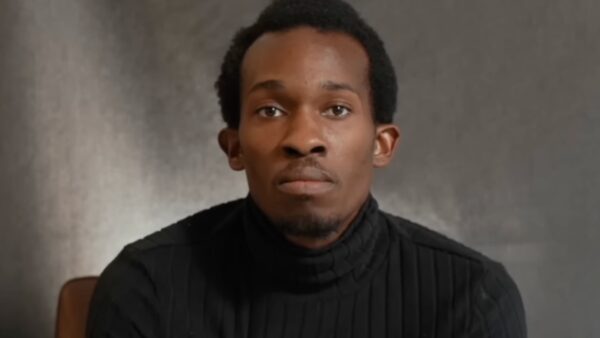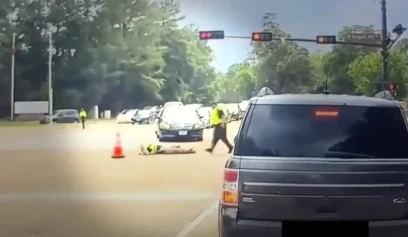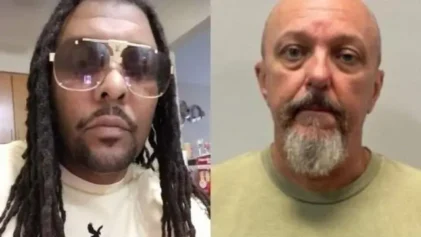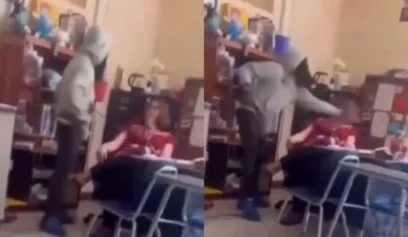A Black LAPD officer who wanted to change the police force from the inside quit after he was racially profiled and arrested in Los Angeles, California, on Aug. 27, 2022.
Bernard Robins spent nine hours in jail before he was released.
Robins was working on a film he’d written — about two teenagers who switch bodies called “Trading Souls” — in front of his parent’s home on West Boulevard near the Inglewood border at around 7 p.m. He was talking with the lighting technician when he noticed two officers staring him down.

Robins, who grew up in Los Angeles, instinctively raised his hands and began walking toward the officers slowly as he notified them he was also an LAPD officer. He also notified the officers that he was carrying his department-issued 9mm Smith & Wesson handgun.
The officers handcuffed him against a fence, and one of the cops said, “You know how this neighborhood is.”
A woman nearby began to record the officers as they went through Robins’ wallet. After finding his department-issued identification, one of the officers claimed that it could be a fake ID. Robins remained handcuffed even after the cops learned his identity and he pleaded with them to call his watch commander.
“This is crazy,” said the woman recording. “He’s a police officer.”
“You work Southwest, right?” asked one of the officers.
“That’s right,” replied Robins.
“Okay, well that’s why I don’t know you; I work 77th,” replied the officer. “Like I said, I’m not trying to target you, man, but now you’re trying to come at me sideways.”
“You’ve got my ID, right, sir, Hernandez?” Robins asked the other officer.
“You understand,” the officer began to reply before Robins interrupted and said, “I understand you have my ID as a police officer, and you’ve still got me handcuffed. Like, come on, bro.”
“If you’re a cop, I’m so sorry that you didn’t know this. But, if you have to know it now, it’s an educational thing,” the cop replied.
Robins later learned that the lighting technician had two guns and drugs inside his backpack, which was inside Robins’ vehicle. The LAPD officer was taken to the 77th Street precinct and questioned by multiple authorities about his connection to the technician, DQuan Clarke before he was finally released around 4:30 a.m. — nine hours after he was first detained.
Clarke was arrested on suspicion of possessing a concealed gun and narcotics, and the former police officer learned a rumor was being spread that Robins was affiliated with a gang known as the Rollin’ 60s Crips. Despite only meeting Clarke two days before the arrest, Robins said he knew he wasn’t affiliated with the gang because he’d just moved from the East Coast and knew few people in Los Angeles.
Robins told The Los Angeles Times that once he began working for the Southwest division of the LAPD, he saw his colleagues go out of their way to hassle people of color and speak to them in a disrespectful manner, as well as stop them for simply walking down the street, especially Black and brown people.
“It’s modern-day slave patrols,” said the former LAPD officer.
Robins became a police officer to honor his aunt, Lashawn Robins, a veteran of the LAPD after she passed away from cancer in 2020. Reportedly, the number of Black LAPD officers had decreased from 14 percent to nine percent in the last 10 years.
During an interview with Comedy Hype reporter Tina Sampay, Robins said he felt betrayed by his colleagues, and he knew he was done working for the LAPD the moment they pretended that they couldn’t verify that Robins was a cop.
“I felt betrayed,” he said. “At that moment, I pretty much knew that, that, that my time with the LAPD was done.”
Robins went on to say that he’d worked his whole life to stay out of trouble and noted that his two brothers were both killed before he became a cop with the LAPD.
“So, for me to shift through all these things and still get the same credentials that you guys have, and for you guys to treat me like this because of the color of my skin, I felt betrayed. It was, it was, it was pretty traumatizing.”
Robins quit the force and sued the department for racial profiling, and started an online campaign to disband the 77th Street gang team.
LAPD Chief Michel Moore told the LA Times that he couldn’t comment on an ongoing internal investigation but did say, “I certainly don’t believe the 77th gang unit should be disbanded.”


